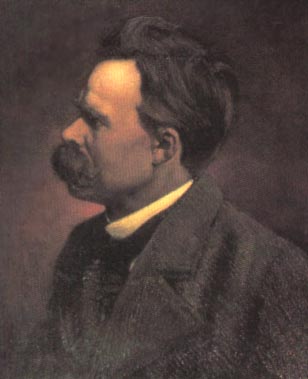 Friedrich Nietzsche |
"...es ist das schrecklichste Gegenmittel gegen ungewöhnliche Menschen, sie dergestalt tief in sich hinein zu treiben, dass ihr Wiederherauskommen jedesmal ein vulkanischer Ausbruch wird. Doch giebt es immer wieder einen Halbgott, der es erträgt, unter so schrecklichen Bedingungen zu leben, siegreich zu leben; und wenn ihr seine einsamen Gesänge hören wollt, so hört Beethoven’s Musik" (Friedrich Nietzsche, 3. Unzeitgemäße Betrachtung; " ... it is the most terrible antidote against unusual individuals to drive them that much back into themselves that their re-emerging causes a volcanic eruption each time. However, there will always be a demi-god, every now and then, who will be able to live under such terrible conditions, and that victoriously: and if you want to hear his lonely songs, listen to Beethoven's music").
What Nietzsche discusses here, namely the "being driven back into oneself" of the unusual individual, is, first and foremost, a possibility with which this important thinker might have been very familiar, himself, and due to this, it forms, perhaps, the first obvious similarity to Beethoven. Does this mean, however, that only individuals of a similar unusual, exceptionally gifted nature can first discover this for themselves, suffer through it and learn to understand it so that they can, in turn, also understand other equally unusual and exceptionally gifted individuals? Is it not, perhaps, also possible that we "ordinary" individuals are, due to one reason or another, classified by our environment as "unusual" and, as a consequence, driven back into ourselves? If we, on the one hand, can recall such incidents in our lives and if we, on the other hand, consider them and learn to understand them, we might be able to imagine both: our being driven back into ourselves on occasion and our mainly belonging to the ordinary majority of individuals who, consciously or unconsciously, take part in driving really exceptional individiuals back into themselves. Perhaps our awareness of the possibility of our "dual role" is the utmost degree of humanity that we can expect from ourselves!
In my consideration of the topic of "Beethoven and Nietzsche", this was the first similarity that I discovered in these two unusual minds and that also reached me in this way as a member of the majority of "ordinary individuals". Whether this occurred due to my continued involvement at this "media" level in dealing with Beethoven or whether this might also have arisen out of my frequent reading of Thomas Mann's novel "Doctor Faustus", I can not determine. What I can determine, however, is, that I, as I mentioned in the section on the future of this website, in dealing with literature and music, also go out from literary works such as Mann's "Doctor Faustus", the topic of which, in turn, enticed me to attempt a comparison of Beethoven and Nietzsche. This enticement arose out of Mann's choice of his hero, the also very exceptionally gifted, lonely composer Adrian Leverkühn who is undoubtedly endowed with character traits of and similarities in fate with this important philosopher, and out of the role of this hero as the composer who would revolutionize Western music that, during the course of the 19th century, was greatly influenced by Beethoven and inevitably had to find new paths at the beginning of the 20th century.
Why would a writer like Thomas Mann endow "his" fictional, gifted and revolutionary composer with character traits of and similarities in fate with Nietzsche? Although we can not clearly answer this difficult question here, we can at least assume that the philosopher that was "used" in this context had to also have been very musical! Should I, however, remain content in taking Mann's fictional account "at face value" or should I, investigative as I am, not try to pursue this issue further in my own manner? As an answer to this question, this presentation might serve as a clear "yes"!
What fascinated me most in the process of trying to find out as to whether and to what degree Nietzsche might have been musically talented, himself, was, of course, the element that brings Beethoven and Nietzsche together, music itself, but also the dynamics of this topic, namely the interest in music of the musically highly gifted philosopher Nietzsche and the interest in literature and philosophy of Beethoven as a composer of his calibre.
While I, due to the design of this presentation, still have to keep you in suspense for a while until we will arrive at discussing as to "how" Nietzsche became involved with music, I want to, right from the start, line myself up at your side as a lay person who is raising questions in order to gain a better understanding, herself, of the entire topic, and hope that you will have as much enjoyment in reading it as I had in working on it. However, this presentation might very likely raise again as many questions as we might be able to find answers to here!
The menu bar to the left will guide you through this topic in chronological order. However, for your convenience we also offer you the following link. The page will take a closer look at the Copernican age and its influences on Beethoven and Nietzsche, since, in a very broad sense, this was the age in which they lived. Have an interesting time of exploration!
Time Table on the Topic